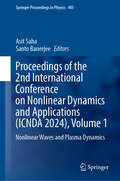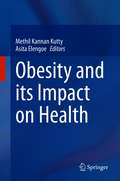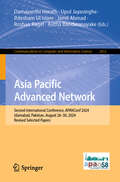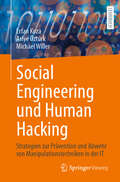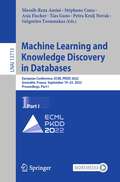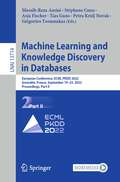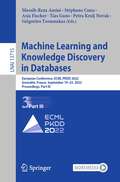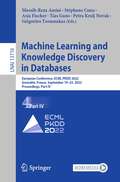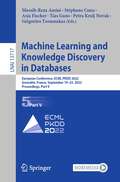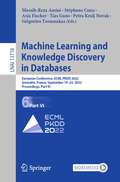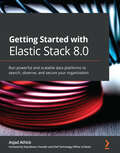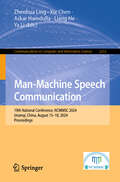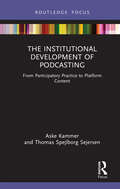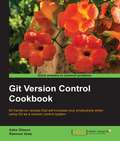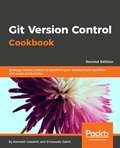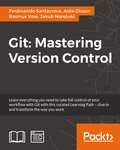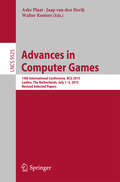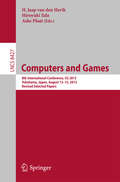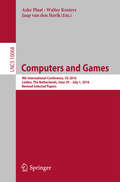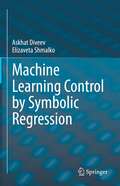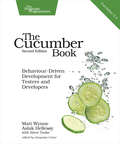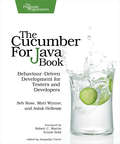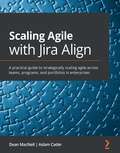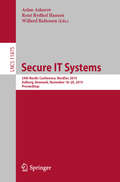- Table View
- List View
Proceedings of the 2nd International Conference on Nonlinear Dynamics and Applications: Nonlinear Waves and Plasma Dynamics (Springer Proceedings in Physics #405)
by Santo Banerjee Asit SahaThis book covers the latest advancements and applications of nonlinear dynamics in various fields of science and engineering, presenting a curated selection of peer-reviewed contributions at the 2nd International Conference on Nonlinear Dynamics and Applications (ICNDA 2024) at Sikkim Manipal Institute of Technology (SMIT). Organized by the Department of Mathematics, SMIT, SMU, this international conference provides a platform for scientists, researchers, and inventors to share their findings and exchange ideas in the ever-evolving field of nonlinear dynamics. This book comprises three volumes. Volume 1 focuses on the investigation of nonlinear waves and plasma dynamics. It covers topics such as strong Landau damping, electron plasma waves, ion-acoustic waves, dusty plasma, dust-acoustic waves, dust-ion-acoustic waves, kinetic Alfven waves, solitary wave, shock waves, periodic wave, cnoidal wave, superperiodic wave, soliton, resonance, lump soliton, multi-soliton, breather wave, upper hybrid wave, atmospheric internal wave, mathematical and analytical methods, quantum and relativistic plasmas, wave instabilities and interactions, fractional and complex systems, nonlinear optical phenomena, Gaussian laser beam, chaos and multistability, and other specific plasma studies.
Obesity and its Impact on Health
by Methil Kannan Kutty Asita ElengoeThis book summarizes the effects of obesity on health and its correlation with a wide range of debilitating and life-threatening conditions in humans. It discusses the possible pathological mechanisms that are involved in the development of obesity and highlights obesity-associated molecular mechanisms that contribute to reproductive dysfunctions in men and women. The book provides mechanistic insights on the role of obesity in cardiovascular and respiratory disorders, and examines the role of the complementary molecular mechanism of the gut microbiota in the development of obesity. It also reviews the interaction between the metabolic system and immune cells in the pathogenesis of obesity-associated diseases. Lastly, it assesses the latest advances in nanomedicine as an emerging strategy for the treatment of obesity.
Asia Pacific Advanced Network: Second International Conference, APANConf 2024, Islamabad, Pakistan, August 26–30, 2024, Revised Selected Papers (Communications in Computer and Information Science #2412)
by Jamil Ahmad Damayanthi Herath Upul Jayasinghe Roshan Ragel Ihtesham Ul Islam Asitha BandaranayakeThis book constitutes the refereed proceedings of the Second International Conference on Asia Pacific Advanced Network, APANConf 2024, held in Islamabad, Pakistan, during August 26–30, 2024. The 14 full papers and 1 short paper included in this book were carefully reviewed and selected from 56 submissions. These papers focus on Artificial Intelligence and Machine Learning, Computer Vision and Wireless Communications and Networks.
Social Engineering und Human Hacking: Strategien zur Prävention und Abwehr von Manipulationstechniken in der IT
by Erfan Koza Asiye Öztürk Michael WillerEntdecken Sie die psychologischen Tricks und Techniken, mit denen Human Hacker Ihre persönlichen Gefühle, Eigenschaften und digitale Verhaltensmuster ausnutzen, um die Informationssicherheit gezielt zu kompromittieren. Dieses Lehrbuch bietet Ihnen einen spielerischen Ansatz, um die Funktionsweise von Social Engineering zu verstehen und sich erfolgreich dagegen zu verteidigen. Erfahren Sie zudem, wie Sie Ihre Wahrnehmung schärfen, Ihre Emotionen kontrollieren und effektive Abwehrstrategien entwickeln können, um Ihre Daten und Ihr Unternehmen vor den Taktiken der Angreifer zu schützen. Ausgestattet mit psychologischen Denkmodellen sowie Abwehrstrategien, werden Sie bereit sein, sich den Herausforderungen des modernen Sicherheitsumfelds zu stellen.
Machine Learning and Knowledge Discovery in Databases: European Conference, ECML PKDD 2022, Grenoble, France, September 19–23, 2022, Proceedings, Part I (Lecture Notes in Computer Science #13713)
by Massih-Reza Amini Petra Kralj Novak Grigorios Tsoumakas Stéphane Canu Asja Fischer Tias GunsThe multi-volume set LNAI 13713 until 13718 constitutes the refereed proceedings of the European Conference on Machine Learning and Knowledge Discovery in Databases, ECML PKDD 2022, which took place in Grenoble, France, in September 2022.The 236 full papers presented in these proceedings were carefully reviewed and selected from a total of 1060 submissions. In addition, the proceedings include 17 Demo Track contributions. The volumes are organized in topical sections as follows: Part I: Clustering and dimensionality reduction; anomaly detection; interpretability and explainability; ranking and recommender systems; transfer and multitask learning; Part II: Networks and graphs; knowledge graphs; social network analysis; graph neural networks; natural language processing and text mining; conversational systems; Part III: Deep learning; robust and adversarial machine learning; generative models; computer vision; meta-learning, neural architecture search; Part IV: Reinforcement learning; multi-agent reinforcement learning; bandits and online learning; active and semi-supervised learning; private and federated learning; . Part V: Supervised learning; probabilistic inference; optimal transport; optimization; quantum, hardware; sustainability; Part VI: Time series; financial machine learning; applications; applications: transportation; demo track.
Machine Learning and Knowledge Discovery in Databases: European Conference, ECML PKDD 2022, Grenoble, France, September 19–23, 2022, Proceedings, Part II (Lecture Notes in Computer Science #13714)
by Massih-Reza Amini Petra Kralj Novak Grigorios Tsoumakas Stéphane Canu Asja Fischer Tias GunsThe multi-volume set LNAI 13713 until 13718 constitutes the refereed proceedings of the European Conference on Machine Learning and Knowledge Discovery in Databases, ECML PKDD 2022, which took place in Grenoble, France, in September 2022.The 236 full papers presented in these proceedings were carefully reviewed and selected from a total of 1060 submissions. In addition, the proceedings include 17 Demo Track contributions. The volumes are organized in topical sections as follows: Part I: Clustering and dimensionality reduction; anomaly detection; interpretability and explainability; ranking and recommender systems; transfer and multitask learning; Part II: Networks and graphs; knowledge graphs; social network analysis; graph neural networks; natural language processing and text mining; conversational systems; Part III: Deep learning; robust and adversarial machine learning; generative models; computer vision; meta-learning, neural architecture search; Part IV: Reinforcement learning; multi-agent reinforcement learning; bandits and online learning; active and semi-supervised learning; private and federated learning; . Part V: Supervised learning; probabilistic inference; optimal transport; optimization; quantum, hardware; sustainability; Part VI: Time series; financial machine learning; applications; applications: transportation; demo track.
Machine Learning and Knowledge Discovery in Databases: European Conference, ECML PKDD 2022, Grenoble, France, September 19–23, 2022, Proceedings, Part III (Lecture Notes in Computer Science #13715)
by Massih-Reza Amini Petra Kralj Novak Grigorios Tsoumakas Stéphane Canu Asja Fischer Tias GunsThe multi-volume set LNAI 13713 until 13718 constitutes the refereed proceedings of the European Conference on Machine Learning and Knowledge Discovery in Databases, ECML PKDD 2022, which took place in Grenoble, France, in September 2022.The 236 full papers presented in these proceedings were carefully reviewed and selected from a total of 1060 submissions. In addition, the proceedings include 17 Demo Track contributions. The volumes are organized in topical sections as follows: Part I: Clustering and dimensionality reduction; anomaly detection; interpretability and explainability; ranking and recommender systems; transfer and multitask learning; Part II: Networks and graphs; knowledge graphs; social network analysis; graph neural networks; natural language processing and text mining; conversational systems; Part III: Deep learning; robust and adversarial machine learning; generative models; computer vision; meta-learning, neural architecture search; Part IV: Reinforcement learning; multi-agent reinforcement learning; bandits and online learning; active and semi-supervised learning; private and federated learning; . Part V: Supervised learning; probabilistic inference; optimal transport; optimization; quantum, hardware; sustainability; Part VI: Time series; financial machine learning; applications; applications: transportation; demo track.
Machine Learning and Knowledge Discovery in Databases: European Conference, ECML PKDD 2022, Grenoble, France, September 19–23, 2022, Proceedings, Part IV (Lecture Notes in Computer Science #13716)
by Massih-Reza Amini Petra Kralj Novak Grigorios Tsoumakas Stéphane Canu Asja Fischer Tias GunsThe multi-volume set LNAI 13713 until 13718 constitutes the refereed proceedings of the European Conference on Machine Learning and Knowledge Discovery in Databases, ECML PKDD 2022, which took place in Grenoble, France, in September 2022.The 236 full papers presented in these proceedings were carefully reviewed and selected from a total of 1060 submissions. In addition, the proceedings include 17 Demo Track contributions. The volumes are organized in topical sections as follows: Part I: Clustering and dimensionality reduction; anomaly detection; interpretability and explainability; ranking and recommender systems; transfer and multitask learning; Part II: Networks and graphs; knowledge graphs; social network analysis; graph neural networks; natural language processing and text mining; conversational systems; Part III: Deep learning; robust and adversarial machine learning; generative models; computer vision; meta-learning, neural architecture search; Part IV: Reinforcement learning; multi-agent reinforcement learning; bandits and online learning; active and semi-supervised learning; private and federated learning; Part V: Supervised learning; probabilistic inference; optimal transport; optimization; quantum, hardware; sustainability; Part VI: Time series; financial machine learning; applications; applications: transportation; demo track.
Machine Learning and Knowledge Discovery in Databases: European Conference, ECML PKDD 2022, Grenoble, France, September 19–23, 2022, Proceedings, Part V (Lecture Notes in Computer Science #13717)
by Massih-Reza Amini Petra Kralj Novak Grigorios Tsoumakas Stéphane Canu Asja Fischer Tias GunsThe multi-volume set LNAI 13713 until 13718 constitutes the refereed proceedings of the European Conference on Machine Learning and Knowledge Discovery in Databases, ECML PKDD 2022, which took place in Grenoble, France, in September 2022.The 236 full papers presented in these proceedings were carefully reviewed and selected from a total of 1060 submissions. In addition, the proceedings include 17 Demo Track contributions. The volumes are organized in topical sections as follows: Part I: Clustering and dimensionality reduction; anomaly detection; interpretability and explainability; ranking and recommender systems; transfer and multitask learning; Part II: Networks and graphs; knowledge graphs; social network analysis; graph neural networks; natural language processing and text mining; conversational systems; Part III: Deep learning; robust and adversarial machine learning; generative models; computer vision; meta-learning, neural architecture search; Part IV: Reinforcement learning; multi-agent reinforcement learning; bandits and online learning; active and semi-supervised learning; private and federated learning; . Part V: Supervised learning; probabilistic inference; optimal transport; optimization; quantum, hardware; sustainability; Part VI: Time series; financial machine learning; applications; applications: transportation; demo track.
Machine Learning and Knowledge Discovery in Databases: European Conference, ECML PKDD 2022, Grenoble, France, September 19–23, 2022, Proceedings, Part VI (Lecture Notes in Computer Science #13718)
by Massih-Reza Amini Petra Kralj Novak Grigorios Tsoumakas Stéphane Canu Asja Fischer Tias GunsThe multi-volume set LNAI 13713 until 13718 constitutes the refereed proceedings of the European Conference on Machine Learning and Knowledge Discovery in Databases, ECML PKDD 2022, which took place in Grenoble, France, in September 2022.The 236 full papers presented in these proceedings were carefully reviewed and selected from a total of 1060 submissions. In addition, the proceedings include 17 Demo Track contributions. The volumes are organized in topical sections as follows: Part I: Clustering and dimensionality reduction; anomaly detection; interpretability and explainability; ranking and recommender systems; transfer and multitask learning; Part II: Networks and graphs; knowledge graphs; social network analysis; graph neural networks; natural language processing and text mining; conversational systems; Part III: Deep learning; robust and adversarial machine learning; generative models; computer vision; meta-learning, neural architecture search; Part IV: Reinforcement learning; multi-agent reinforcement learning; bandits and online learning; active and semi-supervised learning; private and federated learning; . Part V: Supervised learning; probabilistic inference; optimal transport; optimization; quantum, hardware; sustainability; Part VI: Time series; financial machine learning; applications; applications: transportation; demo track.
Getting Started with Elastic Stack 8.0: Run powerful and scalable data platforms to search, observe, and secure your organization
by Asjad Athick Shay BanonUse the Elastic Stack for search, security, and observability-related use cases while working with large amounts of data on-premise and on the cloudKey FeaturesLearn the core components of the Elastic Stack and how they work togetherBuild search experiences, monitor and observe your environments, and defend your organization from cyber attacksGet to grips with common architecture patterns and best practices for successfully deploying the Elastic StackBook DescriptionThe Elastic Stack helps you work with massive volumes of data to power use cases in the search, observability, and security solution areas.This three-part book starts with an introduction to the Elastic Stack with high-level commentary on the solutions the stack can be leveraged for. The second section focuses on each core component, giving you a detailed understanding of the component and the role it plays. You'll start by working with Elasticsearch to ingest, search, analyze, and store data for your use cases. Next, you'll look at Logstash, Beats, and Elastic Agent as components that can collect, transform, and load data. Later chapters help you use Kibana as an interface to consume Elastic solutions and interact with data on Elasticsearch. The last section explores the three main use cases offered on top of the Elastic Stack. You'll start with a full-text search and look at real-world outcomes powered by search capabilities. Furthermore, you'll learn how the stack can be used to monitor and observe large and complex IT environments. Finally, you'll understand how to detect, prevent, and respond to security threats across your environment. The book ends by highlighting architecture best practices for successful Elastic Stack deployments.By the end of this book, you'll be able to implement the Elastic Stack and derive value from it.What you will learnConfigure Elasticsearch clusters with different node types for various architecture patternsIngest different data sources into Elasticsearch using Logstash, Beats, and Elastic AgentBuild use cases on Kibana including data visualizations, dashboards, machine learning jobs, and alertsDesign powerful search experiences on top of your data using the Elastic StackSecure your organization and learn how the Elastic SIEM and Endpoint Security capabilities can helpExplore common architectural considerations for accommodating more complex requirementsWho this book is forDevelopers and solutions architects looking to get hands-on experience with search, security, and observability-related use cases on the Elastic Stack will find this book useful. This book will also help tech leads and product owners looking to understand the value and outcomes they can derive for their organizations using Elastic technology. No prior knowledge of the Elastic Stack is required.
Man-Machine Speech Communication: 19th National Conference, NCMMSC 2024, Urumqi, China, August 15–18, 2024, Proceedings (Communications in Computer and Information Science #2312)
by Ya Li Xie Chen Zhenhua Ling Askar Hamdulla Liang HeThis book constitutes the refereed proceedings of the 19th National Conference on Man-Machine Speech Communication, NCMMSC 2024, held in Urumqi, China, during August 15–18, 2024. The 33 papers included in these proceedings were carefully reviewed and selected from 205 submissions. They deal with topics such as speech technology and large language models, audio processing, prosody modeling and dialogue systems. Key areas include speech recognition, speaker identification and verification, speech/sound/music synthesis, speech enhancement, sound event detection, multimodal systems, conversational AI, phonetics, phonology and prosody analysis, auditory processing, and acoustic scene modeling etc.
The Institutional Development of Podcasting: From Participatory Practice to Platform Content (Disruptions)
by Aske Kammer Thomas Spejlborg SejersenReferring back to the early 2000s, this book traces the development of podcasting from a “do-it-yourself” medium by amateurs into its current environment, where a wide variety of individuals, organizations, and platforms operate in an increasingly crowded and competitive market.Through original case studies of shows and platforms including "The Daily" and Spotify, the authors explore the processes and effects of commercialization, platformization, and datafication in the industry. Drawing on institutional theory and the growing body of scholarly literature about podcasting, they examine the shifts and reorientations in institutional logics that characterize podcasting and present the different types of actors that operate in the commercial and noncommercial podcast markets.The Institutional Development of Podcasting will be of interest to advanced students and researchers of audio media, journalism, and media industries.
Git Version Control Cookbook
by Aske Olsson Rasmus VossThis practical guide contains a wide variety of recipes, taking you through all the topics you need to know about to fully utilize the most advanced features of the Git system. If you are a software developer or a build and release engineer who uses Git in your daily work and want to take your Git knowledge to the next level, then this book is for you. To understand and follow the recipes included in this book, basic knowledge of Git command-line code is mandatory.
Git Version Control Cookbook: Leverage version control to transform your development workflow and boost productivity, 2nd Edition
by Kenneth Geisshirt Aske Olsson Rasmus Voss Emanuele ZattinA series of practical recipes to simplify the Git learning experience and increase your productivity when using Git version controlKey FeaturesExplore practical recipes to use Git’s most advanced featuresLearn how Git references its objects and how history is recordedUse reflog and git fsck to recover lost informationBook DescriptionGit is one of the most popular tools for versioning. Git Version Control Cookbook builds on the success of the previous edition and provides you with an up-to-date guide to solving problems related to versioning.You’ll start by learning about the Git data model and how it stores files and looks at commits. By using simple commands, you’ll learn how to navigate through the database. Once you have accustomed yourself to the basics, you’ll explore techniques to configure Git with comprehensive examples and configuration targets. You’ll gain insights into improving your understanding of branches and recovery from mistakes — right from committing to a wrong branch to recovering lost commits or files. You’ll then move on to discovering the features that Git rebase has to offer and use regular Git merge on other branches. You’ll explore Git notes and learn how to utilize the update, list, and search commands. In addition to this, you’ll learn how to extract metadata from repositories and automate your daily tasks using Git hooks. You’ll then study in detail repository maintenance, patching, and offline sharing. By the end of the book, you’ll have grasped various tips and tricks for everyday usage, while increasing your knowledge of Git providers, integrations, and clients.What you will learnUnderstand the Git data model and use commands to navigate the database Find out how you can recover lost commits or filesForce a rebase on some branches and use regular Git to merge on the restMaster the techniques required to extract metadata from repositoriesExplore Git notes and learn about the various features that it offersSee how to decode different subcommandsWho this book is forThe Git Version Control Cookbook is for you if you are a developer or Build Release manager looking for a full-fledged practical guide that will take your Git knowledge to the next level. Basic knowledge of GNU tools and shell or bash scripting is needed.
Git: Mastering Version Control
by Aske Olsson Rasmus Voss Ferdinando Santacroce Jakub NarebskiLearn everything you need to take full control of your workflow with Git with this curated Learning Path - dive in and transform the way you work About This Book * Master all the basic concepts of Git to protect your code and make it easier to evolve * Filled with practical recipes that will teach you how to use the most advanced features of the Git system * Harness the full power of the Git version control system to customize Git behavior, manipulate history, integrate external tools, and explore platform shortcuts Who This Book Is For This learning path is for software developers who want to become proficient at using the Git version control system. A basic understanding of any version control system would be beneficial. What You Will Learn * Transport your work to a remote repository in a centralized manner * Experiment with your code without affecting functional code files * Explore some tools used to migrate to Git from other versioning systems without losing your development history * Understand the Git data model and how you can navigate the database with simple commands * Debug with Git and use various techniques to find faulty commits * Customize Git behavior system-wide, on a per-user, per-repository, and per-file basis * Master administering and setting up Git repositories, configuring access, finding and recovering from repository errors, and performing repository maintenance * Chose a workflow and configure/set up support for the chosen workflow In Detail Git is one of the most popular types of Distributed Version Control System. Since its inception, it has attracted skilled developers due to its robust, powerful, and reliable features. Like most powerful tools, Git can be hard to approach for the newcomers. However, this learning path will help you overcome this fear and become adept at all the basic and advanced tasks in Git. This course starts with an introduction to version control systems before you delve deeply into the essentials of Git. This serves as a primer for the topics to follow such as branching and merging, creating and managing a GitHub personal repository, and fork and pull requests. You'll also learn how to migrate from SVN using Git tools or TortoiseGit and migrate from other VCSs, concluding with a collection of resources, links, and appendices. As you progress on to the next module, you will learn how you can automate the usual Git processes by utilizing the hook system built into Git. It also covers advanced repository management, including different options to rewrite the history of a Git repository before you discover how you can work offline with Git, how to track what is going on behind the scenes, and how to use the stash for different purposes. Moving forward, you will gain deeper insights into Git's architecture, its underlying concepts, behavior, and best practices. It gives a quick implementation example of using Git for a collaborative development of a sample project to establish the foundation knowledge of Git operational tasks and concepts. By exploring advanced Git practices, you will attain a deeper understanding of Git's behavior, allowing you to customize and extend existing recipes and write your own. This Learning Path is a blend of content, all packaged up keeping your journey in mind. It includes content from the following Packt products: * Git Essentials, Ferdinando Santacroce * Git Version Control Cookbook, Aske Olsson and Rasmus Voss * Mastering Git, Jakub Narebski Style and approach Its step-by-step approach with useful information makes this course the ultimate guide to understanding and mastering Git. This course will show the road to mastery example by example, while also explaining the mental model of Git.
Advances in Computer Games: 14th International Conference, ACG 2015, Leiden, The Netherlands, July 1-3, 2015, Revised Selected Papers (Lecture Notes in Computer Science #9525)
by Aske Plaat Jaap van den Herik Walter KostersThis book constitutes the thoroughly refereed post-conference proceedings of the 14th International Conference on Advances in Computer Games, ACG 2015, held in Leiden, The Netherlands, in July 2015. The 22 revised full papers presented were carefully reviewed and selected from 34 submissions. The papers cover a wide range of topics such as Monte-Carlo Tree Search and its enhancements; theoretical aspects and complexity; analysis of game characteristics; search algorithms; and machine learning.
Computers and Games: 8th International Conference, CG 2013, Yokohama, Japan, August 13-15, 2013, Revised Selected Papers (Lecture Notes in Computer Science #8427)
by Hiroyuki Iida Aske Plaat H. Jaap HerikThis book constitutes the thoroughly refereed post-conference proceedings of the 8th International Conference on Computers and Games, CG 2013, held in Yokohama, Japan, in August 2013, in conjunction with the 17th Computer and Games Tournament and the 20th World Computer-Chess Championship. The 21 papers presented were carefully reviewed and selected for inclusion in this book. They cover a wide range of topics which are grouped into five classes: Monte Carlo Tree Search and its enhancements; solving and searching; analysis of game characteristic; new approaches; and serious games.
Computers and Games: 9th International Conference, CG 2016, Leiden, The Netherlands, June 29 – July 1, 2016, Revised Selected Papers (Lecture Notes in Computer Science #10068)
by Aske Plaat Walter Kosters Jaap Herik1 feel privileged that the J(jh Advances in Computer Games Conference (ACG 10) takes place in Graz, Styria, Austria. It is the frrst time that Austria acts as host country for this major event. The series of conferences started in Edinburgh, Scotland in 1975 and was then held four times in England, three times in The Netherlands, and once in Germany. The ACG-10 conference in Graz is special in that it is organised together with the 11th World Computer#65533; Chess Championship (WCCC), the Sth Computer Olympiad (CO), and the European Union Y outh Chess Championship. The 11 th WCCC and ACG 10 take place in the Dom im Berg (Dome in the Mountain), a high-tech space with multimedia equipment, located in the Schlossberg, in the centre of the city. The help of many sponsors (large and small) is gratefully acknowledged. They will make the organisation of this conference a success. In particular, 1 would like to thank the European Union for designating Graz as the Cultural Capital of Europe 2003. There are 24 accepted contributions by participants from all over the world: Europe, Japan, USA, and Canada. The specific research results ofthe ACG 10 are expected to tind their way to general applications. The results are described in the pages that follow. The international stature together with the technical importance of this conference reaffrrms the mandate of the International Computer Games Association (ICGA) to represent the computer-games community.
Machine Learning Control by Symbolic Regression
by Askhat Diveev Elizaveta ShmalkoThis book provides comprehensive coverage on a new direction in computational mathematics research: automatic search for formulas. Formulas must be sought in all areas of science and life: these are the laws of the universe, the macro and micro world, fundamental physics, engineering, weather and natural disasters forecasting; the search for new laws in economics, politics, sociology. Accumulating many years of experience in the development and application of numerical methods of symbolic regression to solving control problems, the authors offer new possibilities not only in the field of control automation, but also in the design of completely different optimal structures in many fields. For specialists in the field of control, Machine Learning Control by Symbolic Regression opens up a new promising direction of research and acquaints scientists with the methods of automatic construction of control systems.For specialists in the field of machine learning, the book opens up a new, much broader direction than neural networks: methods of symbolic regression. This book makes it easy to master this new area in machine learning and apply this approach everywhere neural networks are used. For mathematicians, the book opens up a new approach to the construction of numerical methods for obtaining analytical solutions to unsolvable problems; for example, numerical analytical solutions of algebraic equations, differential equations, non-trivial integrals, etc. For specialists in the field of artificial intelligence, the book offers a machine way to solve problems, framed in the form of analytical relationships.
Cucumber Recipes: Automate Anything with BDD Tools and Techniques
by Ian Dees Matt Wynne Aslak HellesoyYou can test just about anything with Cucumber. We certainly have, and in Cucumber Recipes we'll show you how to apply our hard-won field experience to your own projects. Once you've mastered the basics, this book will show you how to get the most out of Cucumber--from specific situations to advanced test-writing advice. With over forty practical recipes, you'll test desktop, web, mobile, and server applications across a variety of platforms. This book gives you tools that you can use today to automate any system that you encounter, and do it well.The Cucumber Book showed you how your team can work together to write executable specifications--documents that tell a clear story and also happen to be working test code. We'll arm you with ready-rolled solutions to real-world problems: your tests will run faster, read more clearly, and work in any environment.Our first tips will help you fit Cucumber into your workflow. Powerful filters will tame tables full of test data, transforming them into the format your application needs. Custom output formatters will generate reports for any occasion. Continuous Integration servers will run your Cucumber tests every time the code changes. Next, you'll find recipes tailored to the platform you're running on. Ever wanted to know how to test a Grails app from Cucumber? Need to put a Windows program through its paces? How about a mobile app running on Android or iOS? We'll show you how to do all of these.Throughout the book, you'll see how to make Cucumber sing as you interoperate with different platforms, languages, and environments. From embedded circuits to Python and PHP web apps, Cucumber has something for you.What You Need:You'll need basic working knowledge of Cucumber and Ruby. Individual recipes may have additional requirements; for example, a recipe on Windows automation might pull in an open source GUI driver.We've written the recipes for compatibility with Ruby 1.9.3 and 1.8.7, plus Cucumber 1.1.4. Other versions may work as well, but these are the ones we test with.
The Cucumber Book: Behaviour-Driven Development for Testers and Developers
by Matt Wynne Aslak Hellesoy Steve TookeYour customers want rock-solid, bug-free software that does exactly what they expect it to do. Yet they can't always articulate their ideas clearly enough for you to turn them into code. You need Cucumber: a testing, communication, and requirements tool-all rolled into one. All the code in this book is updated for Cucumber 2.4, Rails 5, and RSpec 3.5. Express your customers' wild ideas as a set of clear, executable specifications that everyone on the team can read. Feed those examples into Cucumber and let it guide your development. Build just the right code to keep your customers happy. You can use Cucumber to test almost any system or any platform. Get started by using the core features of Cucumber and working with Cucumber's Gherkin DSL to describe-in plain language-the behavior your customers want from the system. Then write Ruby code that interprets those plain-language specifications and checks them against your application. Next, consolidate the knowledge you've gained with a worked example, where you'll learn more advanced Cucumber techniques, test asynchronous systems, and test systems that use a database. Recipes highlight some of the most difficult and commonly seen situations the authors have helped teams solve. With these patterns and techniques, test Ajax-heavy web applications with Capybara and Selenium, REST web services, Ruby on Rails applications, command-line applications, legacy applications, and more. Written by the creator of Cucumber and the co-founders of Cucumber Ltd., this authoritative guide will give you and your team all the knowledge you need to start using Cucumber with confidence. What You Need: Windows, Mac OS X (with XCode) or Linux, Ruby 1.9.2 and upwards, Cucumber 2.4, Rails 5, and RSpec 3.5
The Cucumber for Java Book: Behaviour-Driven Development for Testers and Developers
by Matt Wynne Aslak Hellesoy Seb RoseTeams working on the JVM can now say goodbye forever to misunderstood requirements, tedious manual acceptance tests, and out-of-date documentation. Cucumber - the popular, open-source tool that helps teams communicate more effectively with their customers - now has a Java version, and our bestselling Cucumber Book has been updated to match. The Cucumber for Java Book has the same great advice about how to deliver rock-solid applications collaboratively, but with all code completely rewritten in Java. New chapters cover features unique to the Java version of Cucumber, and reflect insights from the Cucumber team since the original book was published.Until now it's been difficult for teams developing Java applications to learn how to benefit from Behaviour-Driven Development (BDD). This book changes all that by describing in detail how to use Cucumber to harness the power of plain language specifications in your development process.In part 1, you'll discover how to use Cucumber's Gherkin DSL to describe the behavior your customers want from the system. You'll also learn how to write Java code that interprets those plain language specifications and checks them against your application. Part 2 guides you through a worked example, using Spring, MySQL, and Jetty. Enhanced chapters teach you how to use Selenium to drive your application and handle asynchronous Ajax calls, and new chapters cover Dependency Injection (DI) and advanced techniques to help keep your test suites fast. Part 3 shows you how to integrate Cucumber with your Continuous Integration (CI) system, work with a REST web service, and even use BDD with legacy applications.Written by the creator of Cucumber and two of its most experienced users and contributors, The Cucumber for Java Book is an authoritative guide that will give you and your team all the knowledge you need to start using Cucumber with confidence.
Scaling Agile with Jira Align: A Practical Guide To Strategically Scaling Agile Across Teams, Programs, And Portfolios In Enterprises
by Dean MacNeil Aslam CaderThis book is for portfolio managers, program managers, product managers, product owners, executives, release train engineers, and scrum masters who want to empower their teams to deliver the right things at the right time and quickly respond to changes in the market. Familiarity with Jira Software is necessary; the book will teach you the rest.
Secure IT Systems: 24th Nordic Conference, NordSec 2019, Aalborg, Denmark, November 18–20, 2019, Proceedings (Lecture Notes in Computer Science #11875)
by René Rydhof Hansen Aslan Askarov Willard RafnssonThis book constitutes the refereed proceedings of the 24th Nordic Conference on Secure IT Systems, NordSec 2019, held in Aalborg, Denmark, in November 2019. The 17 full papers presented in this volume were carefully reviewed and selected from 32 submissions. They are organized in topical sections named: privacy; network security; platform security and malware; and system and software security.
